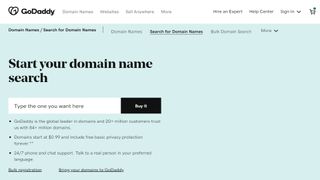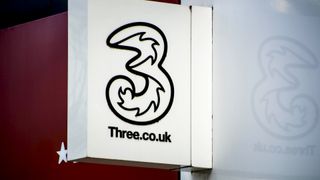Choosing a domain name: tld vs cctld vs exotic
Choosing a domain name helps create a successful website, and can make a good first impression. We guide you through the process

Before you create a website with the best website builder, you’ll need a domain. But how to choose a domain name? You want to make a good first impression, and so it not only needs to be memorable, but needs to send the right message about your website, and by extension your company.
It's vital to make the right choice from the beginning, and to be honest, alongside choosing a provider from among the best web hosting services, choosing a domain name is one of the most critical decisions you’ll need to make before getting your site online. Once you've got the right domain, you can ensure that your website can be found easily and often by your target audience.
While knowing that you need a memorable domain name is one thing, actually achieving this goal is easier said than done. We’ve compiled a list below of elements to consider when you begin your domain name search, and when choosing a domain name.
1. Keep it short

The more characters that potential visitors have to type in, the more likely they are to make a mistake and not reach your site. Some people will check their spelling, realise their error, try again, and still reach your site. But that may not always be the case. Some people will assume that there is a problem with your website instead and won’t bother trying again.
Research shows that the most common domain name length is 12 characters, so try and aim for around that mark.
2. Choose the right TLD
TLD stands for top level domain and is the collection of letters that goes at the end of the domain after the final period. At the beginning of the internet age, there were only a few choices of TLDs, with most sites opting to use .com.
Nowadays, each country has its own two- or three-letter TLD, and there are also specialty TLDs. The most common TLDs are:
Get the ITPro. daily newsletter
Receive our latest news, industry updates, featured resources and more. Sign up today to receive our FREE report on AI cyber crime & security - newly updated for 2024.
- .co or .com — for companies
- .info — for informational sites
- .net – for internet infrastructure sites
- .org – for non-profits and other non-commercial organisations
- .biz – short for business, for those that don’t want .com
- .me – for personal sites and blogs
Many of these can be combined with two-letter codes representing countries to create national TLDs, like .co.uk for companies in the UK.
Many big businesses will purchase a selection of country-specific domains—e.g., example.com, example.co.uk, example.com.au, etc.—and then either redirect them to the one main site or create separate regionalised versions.
Choosing the right domain starts with choosing the right TLD, as it could be the difference between your site being found or not. We recommend choosing .com, as it is widely considered the best for commercial entities, especially those that operate globally.
3. Check existing domains

Once you’ve finished brainstorming domain name ideas, you then need to check to see if someone else has already registered any of them. Many domain name registrars, like GoDaddy, have tools for doing this.
It can also be a good idea to register domains that are obvious misspellings of the one you want to choose, so you can redirect them to your main website. For instance, if you wanted to register socialise.com, you could also register socialize.com. This way, if someone types in the wrong spelling, they’ll still reach your website.
On the other hand, don’t choose domains that are misspellings of established brands in the hope of getting some of their traffic, like Amazen.com or Gooogle.com. That could land you with a lawsuit.
4. Check the language
What we mean by checking the language is finding out whether a word that seems innocuous in English actually has any negative meanings in other languages.
If you’ve spent money on a marketing campaign that proudly features your new domain, the last thing you want to find out is that you’ve unintentionally insulted people in a foreign country or speakers of that country’s language in your own country.
One example of this is when the Ford Kuga was launched worldwide. It was only after the official launch that it was discovered that “kuga” is the word for the Black Death in the Balkans.
5. Search for existing trademarks

If another business has trademarked a word that you use in your domain, you could be in legal trouble, especially if the word you chose is one that’s been made up and not covered by common usage protections.
The knowem.com username search website is a good place to check, as it will show you words that have been used in existing trademarks, domains, and even on social media sites.
6. Avoid hyphens and numbers
Hyphens and underscores should be avoided because they can be easily confused. The same goes for numbers because they can often look like letters, e.g., a zero and a capital “O”, and the number 1, lowercase “l,” and capital “I.”
7. Consider focusing locally

Putting the locality in which your business operates in your domain name can help bring in searchers from surrounding areas.
For instance, if you run a shoe repair business in Boston, BostonShoeRepairs.com would be a good choice. However, you need to be aware that in this example, there is more than one Boston. There is the well-known one in Massachusetts, but there are also 15 others in the US, the original one in Lincolnshire, England, and a whole host of others in countries like South Africa, Ireland, Uzbekistan, Costa Rica, Columbia, Jamaica, Peru, Italy, Cuba, Bolivia, and Andorra.
So, you need to be careful and consider every angle when choosing a domain name.
8. Memorable is good
The easier it is to remember your website’s domain, the more likely it will be found and passed on by word of mouth. For people to tell others about your website, it helps if the domain is easy to pronounce. If you’re targeting a global audience, the domain should also be easy to say in languages other than English.
Coming up with something that meets all these criteria is a tricky task, but the time that you spend on getting it right will be rewarded with higher levels of traffic to your website.
9. Try a word generator
If you find yourself struggling for ideas, you could give online word generators like TextFixer a try. These online tools take key words and merge them together in interesting ways to come up with something unique.
John is a freelance writer and web developer who has been working digitally for over 30 years. His experience is in journalism, print design and web development and he has worked in Australia and the UK. His work has been published in Future publications like TechRadar, Tom's Guide, and ITProPortal.





